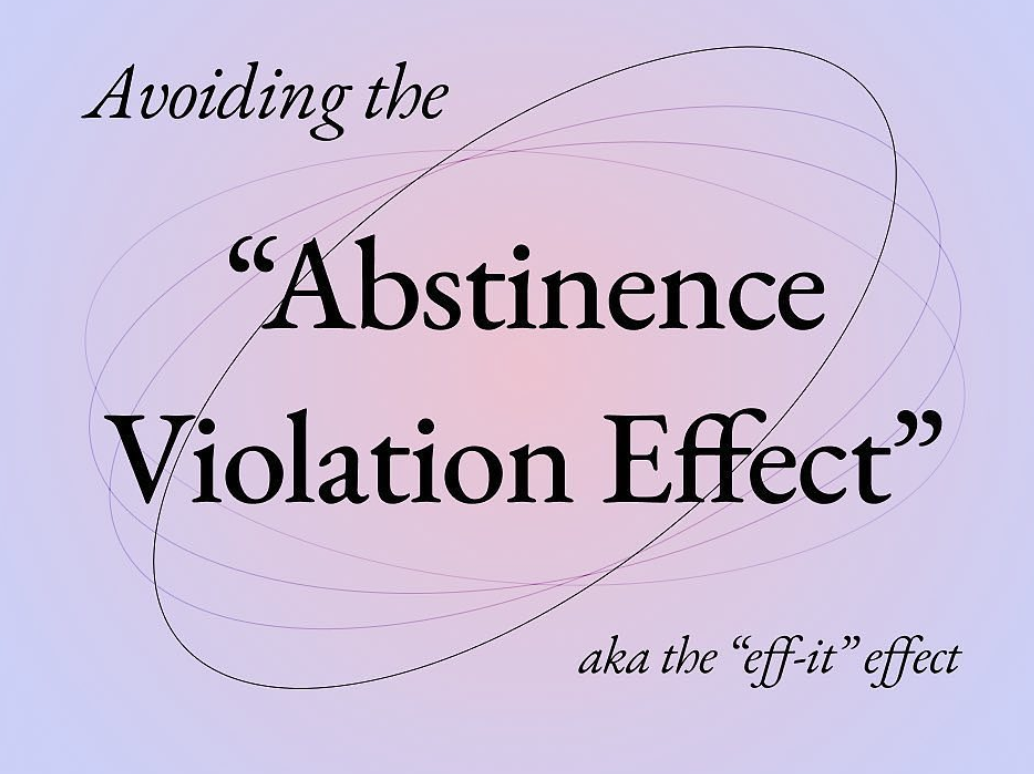Navigating the Abstinence Violation Effect in Eating Disorder Recovery
Navigating the Abstinence Violation Effect in Eating Disorders
Plus 6 Tips to Manage the Abstinence Violation Effect
Have you ever noticed a familiar pattern when it comes to food?
For a stretch of time, you're doing well with exercise and healthy eating. You're mindful of your food choices, counting calories, and seeing positive changes in your lifestyle.
It feels great.
Then, suddenly, a craving hits. Maybe it's pizza, wings, or pasta. You indulge in these forbidden foods, going over your calorie limit for the day.
Panic sets in.
You think all your hard work is wasted, feeling like you've failed and might as well give in to all your cravings since you've already "messed up."
Sound familiar?
If so, know that you're not alone, and there's a name for this phenomenon you've experienced: the abstinence violation effect (AVE).
This psychological phenomenon occurs when someone perceives a lapse or violation of their self-imposed rules or goals, leading to intense negative emotions and potentially triggering a cycle of further harmful behaviors. It's commonly observed in individuals striving to maintain abstinence from behaviors like addiction, behavior changes, or eating disorders.
The AVE occurs due to several underlying psychological mechanisms:
Cognitive Dissonance: When individuals experience a perceived lapse or violation of their goals, it creates a conflict between their beliefs (wanting to maintain abstinence or adhere to specific rules) and their actions (engaging in the behavior). This discrepancy leads to cognitive dissonance, which triggers negative emotions and a sense of internal conflict.
Self-Attribution Theory: Individuals tend to attribute their behavior to internal factors (e.g., personal traits, abilities) or external factors (e.g., situational factors, luck). In the context of the AVE, a perceived lapse is often attributed to internal factors (e.g., lack of willpower, personal failure), intensifying feelings of self-blame and guilt.
Negative Reinforcement: The negative emotions experienced during the AVE serve as aversive stimuli, reinforcing the desire to avoid similar situations in the future. This can lead to avoidance behaviors, increased anxiety, and a heightened focus on maintaining strict control over behavior to prevent future lapses.
Expectancy Violation: Individuals may have certain expectations or beliefs about the consequences of maintaining abstinence or adhering to their goals. When a perceived lapse occurs, it violates these expectations, leading to a sense of disappointment, disillusionment, and a questioning of one's abilities to achieve their goals.
The AVE is a complex interplay of cognitive, emotional, and motivational factors that contribute to intense negative reactions following a perceived violation of self-imposed rules or goals. Understanding the underlying mechanisms can help individuals in recovery develop strategies to manage the AVE effectively and promote resilience in maintaining their desired behaviors.
Understanding the Abstinence Violation Effect in Eating Disorders
For someone in the throws of an eating disorder (or even in eating disorder recovery), a perceived lapse in their prescribed eating plan or body image goals can trigger intense feelings of guilt, shame, and self-blame. This can create a cycle of negative emotions that may lead to further restrictive behaviors, binge eating, or other harmful coping mechanisms.
To understand this even more, let's delve into a scenario to illustrate the AVE: Imagine someone recovering from anorexia nervosa who has been diligently following their meal plan and challenging restrictive thoughts. One day, they attend a social gathering where high-calorie foods are served, and they find themselves indulging in desserts beyond what they planned for.
Afterward, they experience a surge of guilt and self-blame for "losing control" and deviating from their prescribed eating regimen.
They might start to engage in compensatory behaviors like excessive exercise or restriction to "make up for" their perceived lapse.
This response is driven by the abstinence violation effect (AVE), where the perceived violation of their dietary rules triggers intense negative emotions and a sense of failure.
Alternatively, consider someone in recovery from binge eating disorder who has been working on intuitive eating and breaking the cycle of restrictive dieting. One day, they feel overwhelmed by stress and turn to binge eating as a coping mechanism, consuming large quantities of food in a short period. Following this binge episode, they experience shame, guilt, and self-criticism for "falling back" into old patterns. They may engage in compensatory behaviors like strict dieting or purging to counteract the perceived failure. Again, this reaction is fueled by the AVE, where the perceived violation of their recovery goals triggers a cascade of negative emotions and maladaptive coping strategies.
In both examples, the abstinence violation effect manifests as an intense emotional response to a perceived lapse in recovery efforts, leading to further distress and potentially harmful behaviors. Learning to recognize and manage this effect is crucial in eating disorder recovery to promote self-compassion, resilience, and sustainable progress.
Strategies for Managing the Abstinence Violation Effect in Eating Disorder Recovery
We offer Eating Disorder Therapy in Philadelphia!
Develop Self-Compassion: Practice self-compassion and kindness toward yourself, especially during challenging moments. Remind yourself that setbacks are a normal part of recovery and an opportunity for growth, not a reflection of failure.
Challenge All-or-Nothing Thinking: Avoid falling into the trap of all-or-nothing thinking, where a perceived lapse is seen as a complete failure. Instead, acknowledge the progress you've made and focus on continuing forward.
Address Triggers: Identify triggers that may lead to lapses or exacerbate the AVE, such as stressful situations, negative body image thoughts, or social pressures. Develop strategies to manage these triggers effectively, such as seeking support, practicing mindfulness, or engaging in self-care activities.
Seek Professional Support: Work with a therapist or healthcare provider specializing in eating disorders to develop a personalized recovery plan. They can provide guidance, support, and evidence-based interventions to help you navigate the challenges of the AVE and recovery.
Practice Mindfulness: Cultivate mindfulness skills to increase awareness of your thoughts, emotions, and behaviors without judgment. Mindfulness can help you respond to triggers and setbacks with greater resilience and self-awareness.
Celebrate Progress: Celebrate small victories and milestones in your recovery journey. Recognize and appreciate the efforts you're making toward a healthier relationship with food, body image, and self-care.
By understanding the abstinence violation effect and implementing strategies to manage it in eating disorder recovery, you can cultivate resilience, self-compassion, and sustainable progress toward healing and well-being. Remember, recovery is a journey, and every step forward is worth celebrating.



